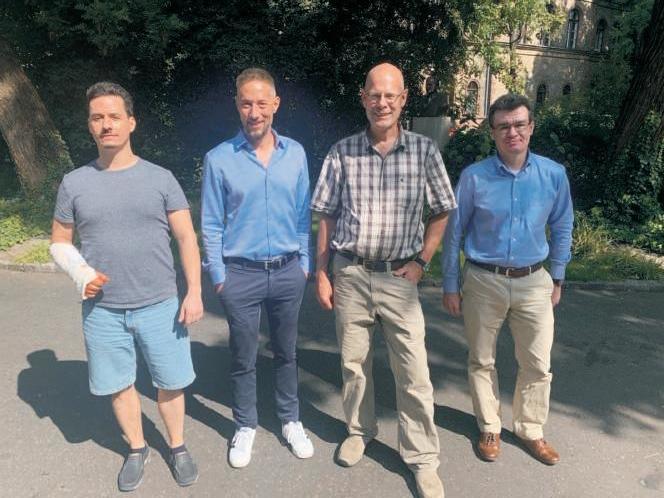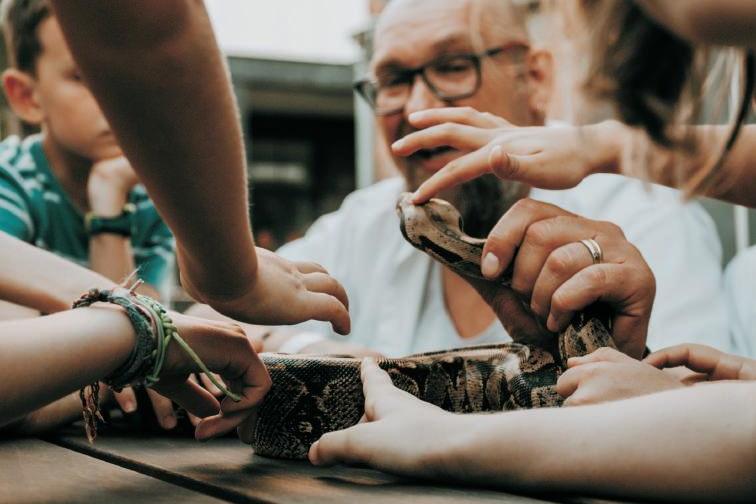
9 minute read
animal lives
regaining the UVMB's independence. His relentless dedication to this cause, coupled with the current higher education trends of operators urging for increased competitiveness and higher international ranking, created a favourable situation for the process, wh i ch w a s r e i n f o r c e d b y t h e i n t e r n a t i o n a l a c c r e d i t a t i o n requirements of the European Association of Establishments for Veterinary Education (EAEVE). I joined the cause on the Professor's request. During the preparations back in Gödöllõ, the Legal Office was established in István Street, where we laid out the founding charter, the institutional rules and the secession agreement as well as managed the procedure with the operator ministry.
– The Secretary General supports the Rector's work in terms of management, legal and administrative affairs. This involves supervising the activities of the Rector's Office, the mailing and filing systems, the coordination of legal affairs, the management of tasks related to the model change, the
Advertisement
– What are your tasks as Secretary General? interactions with the ministry and the operator foundation as well as the lawful and efficient operation of the Senate and the Senate committees. The Secretary General also deals with PR, communication, IT and security affairs.
– Once I acted as a “surgical assistant” when our own Guinea pig was operated on. We adopted him and his sister two years ago through the Hungarian Guinea-Pig Rescue Association. Ever since, the two siblings have served the purposes of science and education in several ways at the university their diagnostic and lab results were included in a publication and they also participated in the making of the propedeutics video for online education (by the way, they behaved quite badly during filming, they failed to live up to the reputation of Guinea pigs).
– I love the park when the magnolias are in blossom. I also love Üllõ, as it's an excellent terrain for horse riding. I
– You even got a taste of “veterinary work”, can you tell us about it?
– Do you have a favourite place at the University? began riding at the age of fifteen. As a matter of fact, I didn't go on purpose, I just escorted my little sister there and I sat on a horse, too. Later on I worked in stables during the school holiday, I practised riding alone and in a class, too. With some breaks in between, I've been sitting in the saddle ever since. But it always remained a hobby, I've never ridden in competitions. I feel I fit into this academic and veterinary environment, since I am keen on nature, animals and hunting.
– When it comes to the future of a 235-year-old institution, you must speak with humility and respect, since the UVMB's bricks have been stacked on top of one another by many generations. I think the key factor is to s e t t h e r i g h t go a l s, b e c a u s e universities cannot survive without a potential for constant growth and i m p r o ve m e n t i n i n t e r n a t i o n a l comparison. I see the present situation as an opportunity which, if we use it wisely, can help us rise among the world's leading institutions.
– How do you envision the University's future?
Fifth-year veterinary student Bettina Fodróczy: "Good communication can save animal lives"
Fifth-year veterinary student Bettina Fodróczy passed her academic “trial by fire” long before obtaining her diploma: by the time our magazine is released, she will have held her presentation in the Hungarian final of FameLab science communication competition in the central building of the Hungarian Academy of Sciences. She is writing a paper on this research for the Student Research Societies, too. Her favourite subject is bacteriology. She plays team handball, does yoga and she's the campus DJ. Her smile is just as winning as her attitude. – This summer I met someone I went to pre-school with. We hadn't seen each other for a long time, and she said it was great I was studying at the veterinary university because she clearly remembered I was already preparing for this career back in preschool.
– I have no veterinarian ancestors, but my mechanic and machinist father instilled the love of dogs in me, and my store manager mother supported me in it, too.
– Bacteriology became my favourite
– So there's a witness to your early commitment. Does this interest run in the family?
– Which area impressed you the most during your studies at the university? subject. I loved the lectures and the practicals. That's part of the reason why I asked Associate Professors Dr. and Dr. László Makrai Norbert Solymosi to be the supervisors for my thesis titled Counting viable of Colony Forming Units with deep neural networks. – Now I can say yes. When we started it, we had no idea if it comes to that or not. The work seems to have paid off. The counting of colony forming units is a daily task for microbiologists, researchers and lab assistants. We breed microbes on a medium in a
– Are you going to develop it into a paper for the Student Research Societies, too?
Petri dish. The number of small white spots appearing on blood agar enables us to determine the exact viable number of the microbe of the particular bacterium. This number is a key indicator in food hygiene and infectology research. This is the process we follow when, for example, we test a hand disinfectant to see how effectively in destroys for example Staphylococcus aureus. If there is many small white spots in the Petri dish, it means many bacteria survived. Our goal is to automate the process of counting colony forming units. No one has come up with a really good and widely-used solution for it so far. Using artificial intelligence, we are d e v e lo p i n g a n a l go r i t h m f o r smartphone applications to solve this task.
– Yes. One of my thesis supervisors told me about the competition in May. Back then I thought I would enter this contest just so we could communicate our results to a larger audience. I made a three-minute video. When I heard I made it to the final, I got very scared at first. I closed the e-mail and I tried to forget it. However, my initial shock was soon gone and I decided to take the challenge of presenting in front of a live audience, too. My preparation for the final included a master course as well.
– In addition, it was an intensive twoday practical course. The atmosphere was great, and I got to meet manym a n y s m a r t , h i g h l y - t r a i n e d researchers. It reassured me that I made the right decision. Not just because it gave me a chance to present my thesis topic, but because I realized I was preparing for a p r o f e s s i o n w h e r e y o u m u s t communicate efficiently with people, like animal caretakers and farmers, because neither food animals nor pets will tell you what their problem is.
– Is this research related to the FameLab science communication competition?
– If you had chosen to bury your head in the sand, you certainly would've missed it. So science communication plays a very important role. Animal lives can be saved if the vet is able to explain owners the processes behind their dogs' health problems and why it's so important to treat them with medicine. Some owners don't want us to administer drugs to the patients. If that happens, we need to be able to explain the case so that we are not the only ones who understand why things
are happening. We must give orientation points for the owner to make a decision, and we need to use the right words and emotional approach.
– Pötyike is a 15-year old fox terrier. Her old owner passed away. She was fostered by a fellow student for a while, that's how I bumped into her on the campus staircase and, well, it was “love” all around. In retrospect, my decision was quite a daring one, but I'm happy I made it and that my parents supported me in this, too. I'm lucky I can leave the foxie at home
"I read psychology-related books, because they can also help me to keep my mental balance"
– I've heard from your fellow students that you are a dedicated owner of a rescue dog. and I don't have to drag the poor thing to the university. She has some agerelated health issues. She's not very fit any more, she gets tired, she's a bit dumb and pees on the floor. S ep a r a t i o n a n x i e t y i s a not h e r behavioural disorder she has. Our Labrador, Dongó is her stronghold in her daily life. She acts as Pötyike's baby sitter.
– I do sports. I've been playing team handball since high school. I think it's a great activity to blow off some steam. I've played in the county top division, in the Budapest league and then in the team of Semmelweis University. I lost a year due to the pandemic, but we are going to trainings again. I hope I'll have time to play again. My other favourite is yoga: it helps me to find myself and my peace of mind in silence. When I have the time, I read psychology-related books, because they can also help me to keep my mental balance. I love doing embroidery, I make little patterns on my friends' T-shirts. Of course, music must be present in my life, I am the campus DJ. I inherited my love of music from by father, who tours Hungary with his wedding band. Boredom and I are far from each other. I've organized a wine-tasting night on campus, and I brought 6-7 fresh items representing the taste of reductive wines from my sister's Burgenland winery. I tend to favour wines from the Balaton Uplands region, though. Finally, I can reveal to you that I planted 80 lavenders and I've already made 60 litres of lavender syrup for my friends.
– I would like to be a very-very good vet who saves a lot of lives and a happy mother, too. I hear the call of my birthplace. I basically imagine my next years to be spent around Lake Fertõ and the city of Sopron, preferably keeping in touch with my current friends and fellow students. I can't and don't want to imagine my life without them.
– How do you keep fit?
– Where and how do you envision your future 10-20 years from now?











